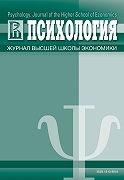Resources of a “Conversation Partner” in a Dialogical I-Other Relationship
Abstract
Authors develop a new approach to the study of one’s relationships with others, which focuses on the conditions and the effects of the dialogical nature of a person. Theoretical modeling, hermeneutics, qualitative and quantitative methods have been applied. The solution for identifying prerequisites of self-development and social positioning of a person that are rooted in dialogical I-Other relationships has been suggested. The originality of the paper is associated with describing the relation to the other as a reflexive I-Other relationship; with an elaborated model that highlights the variety of dimensions of I-Other relationships (between I and Other, I-in-Other, Other-in-Me, I-in-Myself) results in a truly dialogical mode of being; with revealing the potentials of a Conversation Partner in dialogical I-Other relationships (subjective interrelations and significance of Conversation Partners, their activity, fullness of the reflection of significant Conversation Partners); with a description of different hypostases of Conversation Partners (Real, Ideal, Secret, I as Myself) by the means of hermeneutics. The method called “My Conversation Partner” should also be mentioned, as well as the empirical study of existential and social resources of Conversation Partners. Theoretical background of the study was formed by the works of M.M. Bakhtin, M. Buber, M. Heidegger, J.-P. Sartre. E. Levinas, as well as by the works of modern psychologists such as G.M. Kuchinsky, A.V. Rossokhin, E.B. Starovoytenko, C.T. Brown & P.W. Keller, Hubert Hermans, F. Rivetti Ваrbo, etc. Results of the current research have shown that the potential of social adaptivity, affiliation, dominance, positive solitude, joy of solitude, freedom, self-transcendence, existential fulfillment is associated with the richness of one’s Conversation Partners.
Downloads
References
2. Bakhtin, M. M. (1986). Estetika slovesnogo tvorchestva[The aesthetics of verbal creativity]. Moscow: Iskusstvo.
3. Borisov, E. V. (1997). Dialog kak sud’ba. So-Bytie s Drugim v ekzistentsial’noi analitike M.Khaideggera [Dialogue as fate. Co-being with the Other in the existential analytic by M.Heidegger]. Istoriya Filosofii / History of Philosophy, 1, 81-98.
4. Brown, C. T., & Keller, P. W. (1973. Monologue to dialogue. Englewood Kliffs, NJ: Prentice-Hall.
5. Buber, M. (1995). Dva obraza very [Two ways of belief]. Moscow: Respublika. (Transl. of: Buber, M. (1950). Zwei Glaubensweisen [Two ways of belief]. Zu rich: Manesse Verlag. (in German)).
6. Buber, M. (2010). I and Thou. Eastford, CT: Martino Publishing.
7. Fetiskin, N. P., Kozlov, V. V., & Manuilov, G. M. (2002). Sotsial’no-psikhologicheskaya diagnostika razvitiya lichnosti i malykh grupp [Socio-psychological diagnosis of personality development and small groups]. Moscow: Izdatel’stvo Instituta Psikhoterapii.
8. Heidegger, M. (1993). Vremya i bytie [Being and time]. Moscow: Respublika. (Transl. of: Heidegger, M. (1953). Sein und Zeit[Being and time] (7. Auflage). Tübingen: Niemeyer. (in German)).
9. Heidegger, M. (2008). Being and time. New York: HarperCollins.
10. Hermans, H. J. M. (2001). The dialogical self: toward a theory of personal and cultural positioning. Culture and Psychology, 7(3), 243-281.
11. Hsieh, H.-F., & Shannon, S. E. (2005). Three approaches to qualitative content analysis. Qualitative Health Research, 15(9), 1277-1288.
12. Krivtsova, S. V., Längle, A., & Orgler, C. (2009). Shkala ekzistentsii (Existenzskala) A. Längle i C. Orgler [Scale of existence]. Ekzistentsial’nyi Analiz, 1, 141-170.
13. Kuchinskii, G. M. (1988). Psikhologiya vnutrennego dialoga [Psychology of inner dialogue]. Minsk: Universitetskoe.
14. Lévinas, E. (2006). Humanism of the other. Urbana, IL: University of Illinois Press.
15. Likhachev, D. S. (1984). Zhizn’ cheloveka v predstavlenii neizvestnogo avtora 17 v. [The life of a person as presented by an unknown author in the 17th century]. In D. S. Likhachev & E. S. Vaneeva (Eds.), Povest’ o Gore-Zloschastii[Stories of grief and mischief]. Leningrad: Nauka.
16. Mandelshtam, O. E. (1987). Slovo i kul’tura. Stat’i[The word and culture]. Moscow: Sovetskii pisatel’.
17. Osin, E. N., & Leontiev, D. A. (2013). Multidimensional Inventory of Loneliness Experience: structure and properties. Psychology. Journal of Higher School of Economics, 10(1), 55-81.
18. Osnitskii, A. K. (2004). Opredelenie kharakteristik sotsial’noi adaptatsii [Definition of characteristics of social adaptation]. Psikhologiya i Shkola, 1, 43-56.
19. Petrovsky, V. A. (2010). Chelovek nad situatsiei [Person over a situation]. Moscow: Smysl.
20. Petrovsky, V. A. (2013). “Ya” v personologicheskoi perspektive[Self in the personological perspective]. Moscow: HSE Publishing House.
21. Petrovsky, V. A., & Starovoitenko, E. B. (2012). The science of personality: Four projects of general personology. Psychology. Journal of Higher School of Economics, 9(1), 21-39.
22. Puchalska-Wasyl, M. (2007). Types and functions of inner dialogues. Psychology of Language and Communication, 11(1), 43-62.
23. Puchalska-Wasyl, M. (2016). Coalition and opposition in myself? On integrative and confrontational internal dialogues, their functions, and the types of inner interlocutors. Journal of Constructivist Psychology, 29(2), 197-218.
24. Rivetti Varbo, F. (1983). Dialogue: a how do we know what others mean and why? In K. B. Cohen & M. W. Wartofsky (Eds.), Language, logic and method (pp. 409-444). Boston, MA: Springer International.
25. Rossokhin, A. V. (2010). Refleksiya i vnutrennii dialog v izmenyonnykh sostoyaniyakh soznaniya: Intersoznanie v psikhoanalize[Reflection and inner dialogue in altered states of consciousness: interconsciousness in psychoanalysis]. Moscow: Kogito-Tsentr.
26. Sartre, J.-P. (1976). Being and nothingness. An essay on phenomenological ontology. New York: Philosophical Library.
27. Starovoytenko, E B. (2013a). Dostizhenie sebya v otnoshenii k drugomu [A model of “Achieving Oneself” in relationship to the Other]. Mir Psikhologii, 2, 71-85.
28. Starovoytenko, E. B. (2013b). Vozmozhnosti Ya v dialoge s Drugim [Possibilities for the I in a dialogue with the Other]. Mir Psikhologii, 4, 189-204.
29. Starovoytenko, E. V. (2013c). Capacities of the I in relationship with the Other: Hermeneutics and reflection. Psychology. Journal of Higher School of Economics, 10(4), 117-138.
30. Starovoytenko, E. B. (2015). Personologiya: zhizn’ lichnosti v kul’ture[Personology: the life of an individual in culture]. Moscow: Akademicheskii Proekt.
31. Starovoytenko, E. B., & Derbeneva, A. A. (2015). Sub"ektnost’ sobesednika v kontekste otnosheniya Ya-Drugoi [The interlocutor’s subjectness in the context of the I - Other relationship]. Mir Psikhologii, 3, 148-160.





